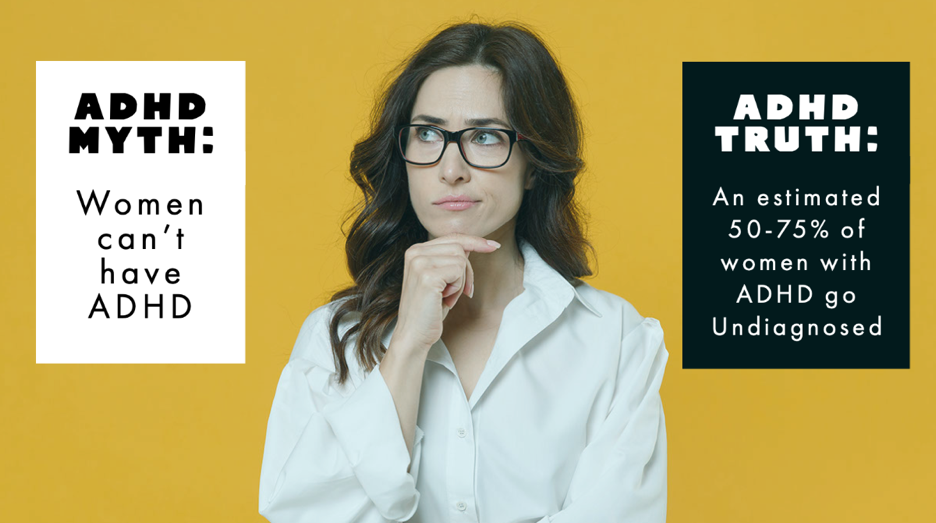
ADHD Myth #1: Women aren’t affected by ADHD
Let’s talk about the #1 myth about ADHD in adult women!
We don’t know who started this, but it’s time to end it.
Not only are 50-75% of women with ADHD undiagnosed, but women aged 26-34 are the fastest growing population undergoing treatment for ADHD.
Why do so many women live with undiagnosed ADHD?
More than a few reasons, but here are a few main ones:
- ADHD symptoms in women as children tend to be more internalized (inattentiveness) vs. externalized (hyperactivity or impulsivity).
- Inattentive ADHD symptoms are more likely to be incompletely diagnosed (or even misdiagnosed) as simply anxiety and/or depression.
- Women are more likely to employ coping strategies to cover up their ADHD symptoms and forego seeking an ADHD diagnosis. (This is at least partly because women are, for better or worse, historically more societally conditioned to be “people pleasers,” which includes efforts to push themselves to look “put together” to others, masking their ADHD symptoms to outsiders.)
Since we’re on the subject, what might a Predominantly Inattentive ADHD patient struggle with?
Inattentive-Predominant ADHD patients can struggle with starting, maintaining effort on, and completing tasks – in any or all areas of their life – whether it’s a chore within the home, a project for work or an essay for school.
The disorganization of an ADHD brain can overwhelm us when there’s decision to make or an action to start – often causing us to either shut down or make mistakes.
Some very common scenarios for Inattentive-Predominant ADHD are:
- If we start a task and we can’t complete it, we can beat ourselves up for “failing”.
- If we start a task and we make mistakes because we can’t maintain our focus on it, we can feel things like frustrated, embarrassed, or “incompetent.”
- And, if we can’t get ourselves to start until the last minute – regardless of how long we had – we stress ourselves out, often using guilt and shame as motivators.
All of these can create feelings of anxiety and/or leave ourselves mentally (and sometimes physically) exhausted.
Are there any groups of women more likely to be diagnosed with ADHD?
In general, those undergoing stressful life events or other big life changes – even positive ones, like getting a promotion! When we change our environment or add more responsibility onto our plate, our coping strategies that we have trained our brains to use to overcome our ADHD symptoms cannot always keep up. This is a very common time for patients to do some self-reflection on their ADHD symptoms – which have often been around for years – and decide to reach out.
Some common groups of women seeking out a diagnosis for ADHD include:
- Women starting graduate school
- Women changing or starting new jobs
- Mothers of young children, particularly those who have recently gone back to work
- Mothers whose children were recently diagnosed with ADHD
How can we help reduce instances of undiagnosed ADHD?
Normalize ADHD. Not only in women but in everyone. Help end the stigma around it.
ADHD is a neurological disorder – it isn’t a choice. So don’t be afraid to seek help if you feel yourself struggling with it.
Take our ADHD Assessment and sign up for an ADHD evaluation with Focus Partners. Our ADHD specialists provide online ADHD treatment services via telemedicine to our members located in Ann Arbor, Chicago, Cincinnati, Cleveland, Columbus, Dayton, Toledo and throughout the states of Illinois, Michigan and Ohio.
